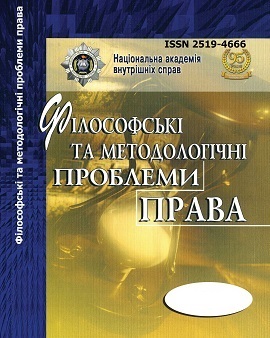Methodology of Integration of Basic Models of Justification of Legal Normativity as a Philosophical and Legal Problem
Abstract
The work aims to show, that existing theoretical and scientific conceptualizations of solving the question of legal normative are insufficient. In particular, regarding the correlation between «existing» and «proper» in terms of justification of law, no agreement has been reached by that time. As a consequence, the methodological approaches to such a justification diverge, depending on the recognition of the primacy of ontological or deontological aspects of it.
This paper explores the two ways of justification of law. The author believes that first of all in the development and analysis of methodological approaches to the formulation and justification of legal normativity, it is reasonable to base such studies on integrative paradigms that make it possible to avoid the «polarization» of the ontological and deontological aspects of the said justification and, accordingly, logical contradictions, which are usually caused by the absolutisation of any of these aspects. The most constructive way in this direction is to build legitimate models based on «conceptual pictures» of legal reality, which include in their system context not only the form of «materialized» existence of law, but also the ways and processes of its comprehension and ideological and value representation.
Also, in analyzing the problems associated with the argument regarding the recognition of the legal nature of a particular norm or institution, it should be borne in mind that such an argument cannot be reduced to a reference to the normative acts of the current legislation, since in relation to any of its constituents a question may be asked regarding it its own legitimacy. In the role of basic criterial measures in addressing such issues, it is appropriate to consider the degree of promotion of the legal law to achieve a general equilibrium, harmony and well-being in society, as well as the level of opportunities provided by this law for the socialization of the individual, his free self-determination and access to social values and goods. The article prеsents the authorʼs view on the intеgrative approach to solving the methodologica1 contradictions between ontologistic and deontologistic models of justification of law.
Downloads
Abstract views: 121 PDF Downloads: 163
Copyright (c) 2018 Philosophical and Methodological Problems of Law

This work is licensed under a Creative Commons Attribution-NonCommercial-NoDerivatives 4.0 International License.
- Authors reserve the right to authorship of their own work and transfer to the magazine the right of the first publication of this work under the terms of the Creative Commons Attribution License, which allows other persons to freely distribute published work with mandatory reference to authors of the original work and the first publication of an article in this magazine.
- Authors have the right to enter into separate additional agreements on non-exclusive dissemination of the work in the form in which it was published in the journal (for example, to post an article in the institution's repository or to publish as part of a monograph), provided that the link to the first publication of the work in this journal is maintained.
- The journal's policy allows and encourages the posting of articles by authors on the Internet (for example, in electronic storehouses of institutions or on personal websites), both before the submission of this manuscript to the editorial office and during its editorial processing, as this contributes to the creation of a productive scientific discussion and positively affects the efficiency and dynamics of citing the published work.




